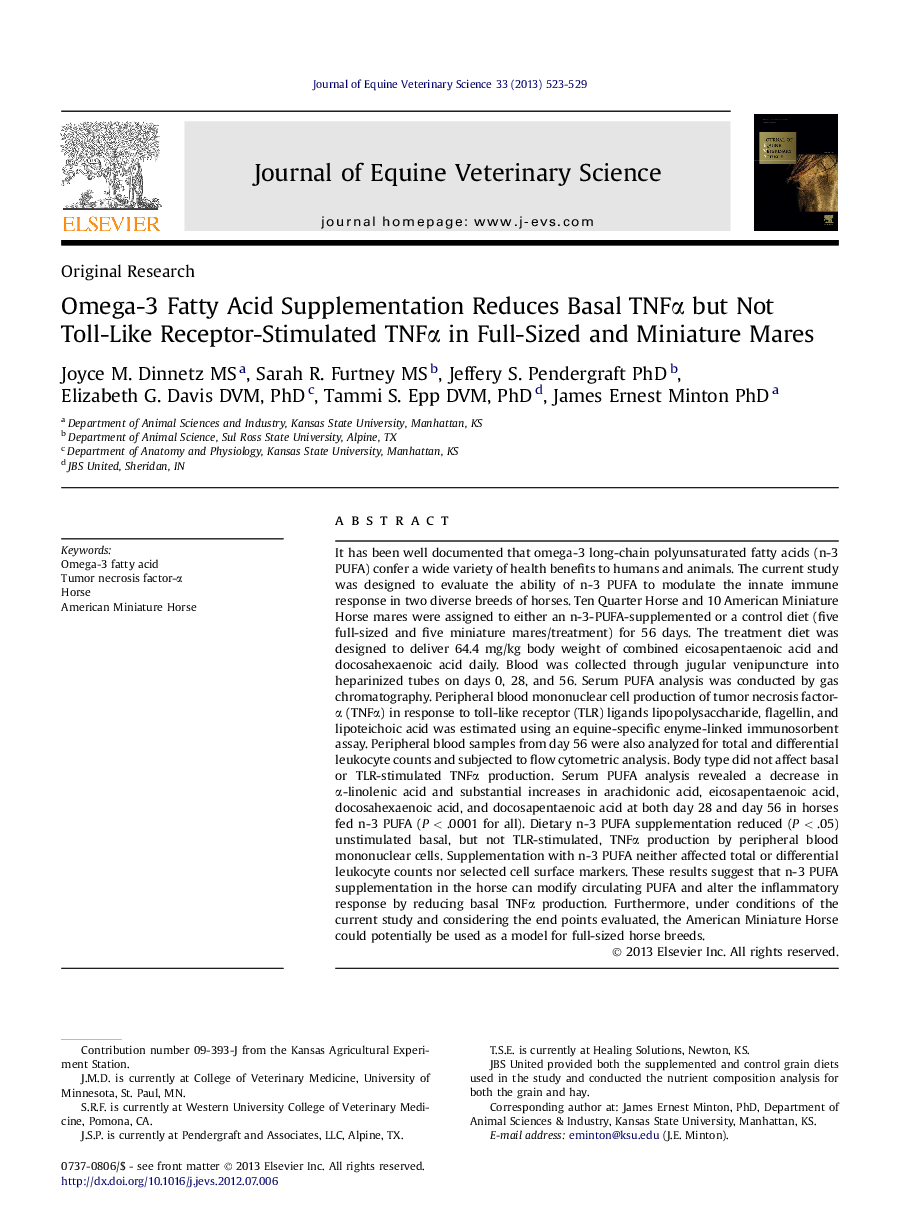| کد مقاله | کد نشریه | سال انتشار | مقاله انگلیسی | نسخه تمام متن |
|---|---|---|---|---|
| 10961309 | 1101546 | 2013 | 7 صفحه PDF | دانلود رایگان |
عنوان انگلیسی مقاله ISI
Omega-3 Fatty Acid Supplementation Reduces Basal TNFα but Not Toll-Like Receptor-Stimulated TNFα in Full-Sized and Miniature Mares
دانلود مقاله + سفارش ترجمه
دانلود مقاله ISI انگلیسی
رایگان برای ایرانیان
کلمات کلیدی
موضوعات مرتبط
علوم زیستی و بیوفناوری
علوم کشاورزی و بیولوژیک
علوم دامی و جانورشناسی
پیش نمایش صفحه اول مقاله

چکیده انگلیسی
It has been well documented that omega-3 long-chain polyunsaturated fatty acids (n-3 PUFA) confer a wide variety of health benefits to humans and animals. The current study was designed to evaluate the ability of n-3 PUFA to modulate the innate immune response in two diverse breeds of horses. Ten Quarter Horse and 10 American Miniature Horse mares were assigned to either an n-3-PUFA-supplemented or a control diet (five full-sized and five miniature mares/treatment) for 56 days. The treatment diet was designed to deliver 64.4 mg/kg body weight of combined eicosapentaenoic acid and docosahexaenoic acid daily. Blood was collected through jugular venipuncture into heparinized tubes on days 0, 28, and 56. Serum PUFA analysis was conducted by gas chromatography. Peripheral blood mononuclear cell production of tumor necrosis factor-α (TNFα) in response to toll-like receptor (TLR) ligands lipopolysaccharide, flagellin, and lipoteichoic acid was estimated using an equine-specific enyme-linked immunosorbent assay. Peripheral blood samples from day 56 were also analyzed for total and differential leukocyte counts and subjected to flow cytometric analysis. Body type did not affect basal or TLR-stimulated TNFα production. Serum PUFA analysis revealed a decrease in α-linolenic acid and substantial increases in arachidonic acid, eicosapentaenoic acid, docosahexaenoic acid, and docosapentaenoic acid at both day 28 and day 56 in horses fed n-3 PUFA (P < .0001 for all). Dietary n-3 PUFA supplementation reduced (P < .05) unstimulated basal, but not TLR-stimulated, TNFα production by peripheral blood mononuclear cells. Supplementation with n-3 PUFA neither affected total or differential leukocyte counts nor selected cell surface markers. These results suggest that n-3 PUFA supplementation in the horse can modify circulating PUFA and alter the inflammatory response by reducing basal TNFα production. Furthermore, under conditions of the current study and considering the end points evaluated, the American Miniature Horse could potentially be used as a model for full-sized horse breeds.
ناشر
Database: Elsevier - ScienceDirect (ساینس دایرکت)
Journal: Journal of Equine Veterinary Science - Volume 33, Issue 7, July 2013, Pages 523-529
Journal: Journal of Equine Veterinary Science - Volume 33, Issue 7, July 2013, Pages 523-529
نویسندگان
Joyce M. MS, Sarah R. MS, Jeffery S. PhD, Elizabeth G. DVM, PhD, Tammi S. DVM, PhD, James Ernest PhD,